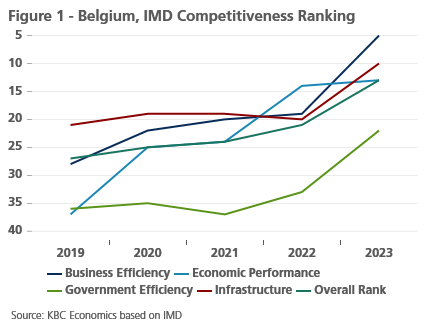IMD World Competitiveness ranking


On 20 June, the International Institute for Management Development (IMD), a renowned Swiss university, published its 2023 World Competitiveness Ranking. First published in 1989, this report uses a combination of survey and statistical data to score the competitiveness of 64 countries around the world. It evaluates each of those countries on four criteria. First, it looks at a country’s economic performance by analyzing its domestic economy, its international trade and investment performance, and its employment and prices. Second it looks at government efficiency in terms of public finances, tax policy, institutional and societal framework and business legislation. Third, it evaluates business efficiency by looking at productivity, the labour market, finance, management practices and attitudes and values. Finally, it scores infrastructure, not only by looking at basic infrastructure, but also at technological, scientific, health and environment and education infrastructure. By aggregating scores on these four criteria, it can rank each country in this index.
The results
Denmark topped the ranking for the second year in a row. The Scandinavian country performs especially strongly in the categories Business Efficiency and Infrastructure. It also improved its score on Government Efficiency. Ireland made a remarkable improvement this year by jumping 9 spots to reach the second place. The Celtic Tiger made solid improvements across all major categories and now even ranks first in terms of economic performance. The bronze medal went to Switzerland, which has the best infrastructure and the most efficient government according to IMD.
Noteworthy in this year’s ranking was Belgium’s marked improvement. It is now placed 13th, a big jump in comparison to its 21st rank last year. Improvements were observed in all categories (see figure 1). Especially its fifth rank on business efficiency (19th last year) was impressive, thanks in large part due to an excellent score on management practices as well as finance and productivity and efficiency. Though this rise in the ranking is encouraging for the country’s prospects, there are still major areas for improvement. Tax policies are scored close to the bottom of the list and scores on employment, prices, public finances and basic infrastructure remain (far) below average.

Belgium also scores very well in comparison to its neighbouring countries. Only the Netherlands outperformed Belgium, reaching the fifth spot this year. The Netherlands scored especially well on Business Efficiency and Infrastructure. Belgium’s other neighbours all declined in this year’s ranking. Luxembourg and Germany lost 7 places, reaching 20th and 22nd place, respectively. Post-Brexit United Kingdom ended 6 spots lower, reaching 29th place, while France performed even worse, dropping to the 33rd spot this year.
Among CEE markets, the stellar performance of the Czech Republic stood out. It jumped 8 spots to reach the 18th place, thanks to improvements in business and government efficiency. Other countries, e.g. Hungary (46th), Slovakia (53rd) and Bulgaria (57th) have more margin for improvement.
When looking at the world’s largest economies, the United States’ performance stands out with its 9th place, thanks to great scores on economic performance and infrastructure (especially on science). China’s ranking meanwhile was four places lower than last year, reaching 21st place in 2023 as its scores deteriorated across all categories. The world’s largest country (in terms of population), India also saw its ranking decline to the 40th place (vs 37th last year), as it is near the bottom of the ranking on education and health and environment. A major turnaround will be needed if the country wants to speed up its economic rise.
At the bottom of the ranking, we find two Latin-American economies, Argentina (63rd) and Venezuela (64th). This is unsurprising given the hyperinflationary and economically dysfunctional environment they currently both operate in.
Conclusion
The IMD World Competitiveness ranking makes for an interesting read. The results not only indicate which country is currently performing well economically, but also indicate whether a country will be able to achieve long-term sustained growth. It also allows countries to see what are the major areas for improvement. An interesting read indeed!
